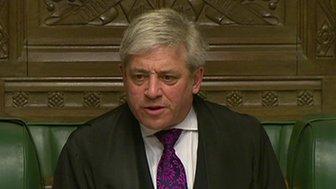Farewell, Speaker Bercow?
- Published
- comments
What a week - first Clarkson, then Zayn, and now Bercow?
There was a certain tension in the air last night, as Mr Speaker Bercow presided at a farewell dinner for Deputy Speaker Dawn Primarolo; later today she'll probably be presiding over a short Commons debate that might decide whether the Speaker will need a farewell dinner of his own….
The ambush was brilliantly laid. Tory MPs were kept in Westminster for a party election briefing from their campaign supremo, Lynton Crosby. Labour and Lib Dem MPs were heading off to their constituencies to campaign, secure in the assumption that there was no controversial business left to vote on. So the Conservatives have the numbers and the other parties don't.

At 5.30pm on Wednesday, the Leader of the House dropped in to see the Speaker, to tell him the government was putting down a motion to change the Commons Standing Orders on the re-election of the Speaker, after a General Election.
I'd love to have been a fly on that office wall.
Under the old rules, MPs are presented with a motion that the incumbent Speaker should resume the Chair; if it is opposed, they march through the lobbies. The change would put in a secret ballot, instead. The importance of this is that open opposition to a sitting Speaker, who is then re-elected, can invite years of retribution, with offenders called late to speak, if at all and all kinds of subtle shafting beyond that.
A secret ballot, the argument goes, would allow the more timorous MPs to vote against a Speaker without fear of revenge.
The idea has been floating about for years - it was mooted by the Commons Procedure Committee back in 2011, although the committee has since changed its mind. And even when there was plenty of spare Commons time available, it was never debated. Incidentally the Committee chair, the Conservative Charles Walker, who helped drag Speaker Bercow to the Chair in 2009, was not consulted on the decision to put one of his committee's ex-recommendations to the House.
Labour are furious.
I hear they're trying to pull MPs back - and may be helped by the three urgent questions the Speaker has (spookily enough) allowed today, which will allow extra time for them to get back. Lib Dem MPs are not being whipped in support of the motion - or indeed encouraged to come back if they've headed off to their constituencies.
How will Tory MPs be whipped? Their attendance is being required on a strict three line whip - but does that extend to a whip on a House matter? Inquiring backbenchers will be seeking an answer on that point. Will ministers vote? And, of course, even if the vote is officially a free vote, the fact that the motion is signed by the Leader of the House makes it pretty official, and Conservative whips may - unofficially, of course - be encouraging colleagues into the Yes Lobby.
What will the upshot be? My guess is that the Conservative strategy has been successful and that the motion will be carried; apart from anything else there is plenty of support for the general principle of secret ballots for this kind of vote.
But the ambush by which the majority has been achieved has ruffled feathers. Rumour reaches me of a bitter exchange between the Shadow Leader of the House, Angela Eagle and Messrs Hague and Gove. And this could imply a breakdown of trust in the "usual channels" through which much Commons business is stage-managed.
Expect more venom in today's exchanges.
I'm not sure that would be a bad thing, in many ways, but it wouldn't be much fun for MPs if it meant endless late night votes and counter-ambushes. The last time relations broke down, in the 1970s, the ensuing months of grind arguably drove a number of elderly members to an early grave.
Meanwhile it might be premature to assume that a secret ballot dooms Speaker Bercow. He has some support on the Tory benches, and his survival would depend on the mathematics of the next House of Commons. But there's a deeper question: is the Speakership now becoming mired in party politics? Might we see incoming majorities defenestrating uncongenial Speakers as a matter of routine?
Certainly in a hung parliament, the rulings from the Chair could be critical - and providing a simpler way of removing a Speaker could be quite convenient for future cross party alliances or governments.
One final thought. Watch Sir Gerald Kaufman. Barring the unexpected, he will be the Father of the House in the next Commons and will preside over the Speaker (re) election process.
One of the urgent questions granted today is from him - and he's said to be furious about the Conservatives' actions.